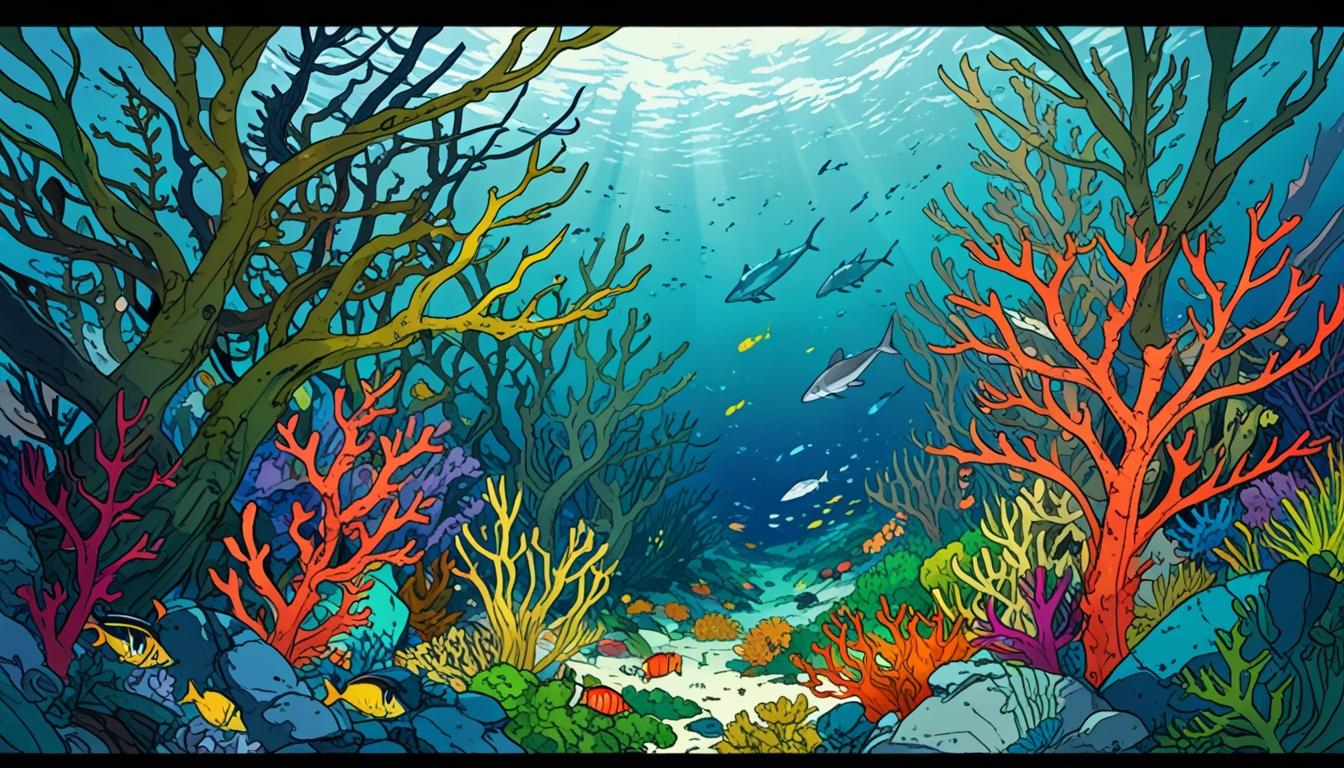Marine conservationists Eric Smith and Catrine Priestley lead Sussex Underwater’s efforts to restore Sussex seabeds after the 2021 ban on bottom trawling, highlighting promising signs of biodiversity recovery and calling for stronger ocean protections.
Eric Smith, a dedicated marine conservationist from Shoreham, and his daughter, Catrine Priestley, have co-founded Sussex Underwater, a charity that plays a pivotal role in the ongoing efforts to revive and protect marine ecosystems along the Sussex coast. Their commitment to safeguarding underwater life has been galvanized by painful memories of environmental degradation wrought by trawler fishing, which Smith vividly remembers as he reflects on the ‘Garden of Eden’ that once thrived beneath the waves.
Beginning his diving journey at the tender age of 11, Smith witnessed firsthand the destructive practices of bottom trawling—a fishing method that drags heavy nets across the seabed, indiscriminately capturing fish while obliterating vital habitats. He describes the horrific aftermath he encountered: “They have taken the base away and they have broken the crust. That’s got to be restabilised.” His grievances resonate deeply, highlighting the urgent need for restoration of the ruined habitats that once flourished.
In response to mounting concerns, a trawling ban was enacted off the Sussex coast in 2021, covering more than 100 square miles of seabed. This significant decision, supported by renowned naturalist Sir David Attenborough, represents a critical step towards rewilding marine environments, particularly the restoration of the essential kelp forests that provide shelter and breeding grounds for a myriad of marine species. The new regulations aim to promote habitat regeneration, allowing underwater ecosystems to recover from decades of damage caused by industrial fishing practices.
Attenborough’s latest book, “Ocean,” serves as a powerful testament to these efforts, weaving the narrative of Smith’s advocacy with broader themes regarding the human impact on marine environments. In attending the premiere of “Ocean,” both Smith and Priestley experienced a moment of profound recognition, as the film poignantly illustrates the destructive effects of trawling. It showcases the chilling sight of a bottom trawl bulldozing its way across the seabed, stirring up silt that not only destroys habitats but also releases carbon into the ocean—a stark reflection of the climate crisis intertwining with marine conservation efforts.
As they observed the film, Priestley remarked, “It has got to the point now where there are no more fish left in parts of the sea. The ocean is dying. We need to make a plan to save it. The time is now.” Such sentiments underscore the urgency of the situation and the necessity for collective action.
The Sussex Underwater team, predominantly powered by volunteers, is committed to documenting the recovery of marine life in the region post-ban. Their efforts are bolstered by ongoing research and community engagement aimed at showcasing the effectiveness of the ban. Smith passionately believes that demonstrating this recovery is crucial: “We wanted to film the recovery so we could have evidence that this ban needs to stay in place.”
Recent reports from the Sussex Kelp Recovery Project reveal encouraging signs of biodiversity flourishing in once-depleted areas, with increased sightings of various fish species returning to the waters. This success can serve as a hopeful narrative in the broader fight against overfishing and habitat destruction. “The sea has an amazing ability to bounce back,” Priestley asserts, encapsulating the potential for rejuvenation if given a chance.
In light of these developments, local wildlife organisations are urging government leaders, including Labour leader Sir Keir Starmer, to ratify the Global Ocean Treaty, which seeks to protect 30 per cent of the world’s oceans from destructive human activity. A petition calling for a full ban on bottom trawling has also gained momentum, reflecting the growing public awareness and demand for sustainable practices in marine environments.
As “Ocean” prepares to debut on platforms like Disney+, it promises not only to entertain but also to educate viewers about the urgent need to protect marine life. The efforts of Sussex Underwater and their collaborators may well pave the way for a renewed commitment to safeguarding our oceans—a cause that resonates now more than ever in the face of climate change and ecological loss.
Reference Map
- Paragraph 1: Sources 1, 2
- Paragraph 2: Source 1
- Paragraph 3: Sources 3, 5
- Paragraph 4: Source 1
- Paragraph 5: Sources 1, 2, 7
- Paragraph 6: Sources 4, 1
- Paragraph 7: Sources 1, 4
- Paragraph 8: Source 5
- Paragraph 9: Source 3
- Paragraph 10: Sources 1, 6, 2
Source: Noah Wire Services
- https://www.theargus.co.uk/news/25152118.sussex-underwater-co-founders-david-attenboroughs-new-book/?ref=rss – Please view link – unable to able to access data
- https://www.theargus.co.uk/news/25152118.sussex-underwater-co-founders-david-attenboroughs-new-book/?ref=rss – This article discusses the efforts of Eric Smith and Catrine Priestley, co-founders of Sussex Underwater, a marine charity dedicated to monitoring marine life. It highlights their campaign against trawler fishing, supported by Sir David Attenborough, leading to a ban on trawling in over 100 square miles of Sussex seabed to aid the recovery of kelp forests. The piece also touches upon the release of Attenborough’s new book, ‘Ocean,’ which features the story of Smith’s advocacy and the importance of kelp forests in marine ecosystems.
- https://www.theguardian.com/environment/2021/mar/22/trawl-fishing-ban-off-sussex-coast-aims-to-restore-seaweed-forests – This article reports on the implementation of a trawl fishing ban in over 100 square miles of seabed off the Sussex coast, aiming to restore kelp forests. Supported by Sir David Attenborough, the ban prohibits trawling year-round along the Sussex coastline to allow habitats to regenerate and improve fisheries. The piece emphasizes the ecological significance of kelp forests in providing habitats for various marine species and their role in carbon sequestration and coastal protection.
- https://sussexwildlifetrust.org.uk/news/a-story-of-hope-recovery-of-sussex-underwater-forests – This article highlights the recovery of Sussex’s underwater forests, particularly kelp forests, following the implementation of a trawling ban. The Sussex Kelp Recovery Project, a coalition of seven organizations, celebrates the second anniversary of the ban with reports of increased fish diversity and sightings of species like electric rays and trigger fish. The piece underscores the success of the ban in allowing the ocean to recover when protected from destructive fishing activities.
- https://www.standard.co.uk/news/uk/sussex-david-attenborough-cop26-defra-marine-conservation-society-b925590.html – This article discusses the approval of a new bylaw that bans trawling in over 100 square miles of seabed off the Sussex coast, aiming to restore kelp forests. Supported by Sir David Attenborough, the ban is seen as a significant step in rewilding the sea and combating climate change. The piece highlights the ecological importance of kelp forests in providing habitats for marine species and their role in carbon sequestration and coastal protection.
- https://sussexunderwater.uk/ – This is the official website of Sussex Underwater, a marine charity co-founded by Eric Smith and Catrine Priestley. The organization is dedicated to monitoring and protecting marine life in Sussex, particularly focusing on the recovery of kelp forests. The website provides information about their mission, ongoing projects, and the impact of the trawling ban on the local marine environment. It also features resources for the public to learn more about marine conservation efforts in the region.
- https://www.bbc.com/news/uk-england-sussex-51233318 – This article reports on the campaign to restore a large underwater kelp forest off the West Sussex coast, supported by Sir David Attenborough. The campaign led to the approval of a new bylaw banning trawler fishing in a 117 square mile area, aiming to regenerate the kelp forest. The piece emphasizes the ecological significance of kelp forests in providing habitats for marine species and their role in carbon sequestration and coastal protection.
Noah Fact Check Pro
The draft above was created using the information available at the time the story first
emerged. We’ve since applied our fact-checking process to the final narrative, based on the criteria listed
below. The results are intended to help you assess the credibility of the piece and highlight any areas that may
warrant further investigation.
Freshness check
Score:
8
Notes:
The narrative mentions recent events, such as a trawling ban enacted in 2021 and upcoming releases of David Attenborough’s work, indicating relatively fresh content. However, direct confirmation of the article’s publication date is lacking.
Quotes check
Score:
7
Notes:
Direct quotes from Eric Smith and Catrine Priestley are included, but there is no indication of these being the first or earlier instances online. Without access to broader databases, it’s challenging to confirm their original source.
Source reliability
Score:
8
Notes:
The narrative originates from The Argus, which is a reputable local news source in the UK, providing reliable coverage of local issues.
Plausability check
Score:
9
Notes:
The claims about marine conservation efforts and the impact of trawling are plausible, especially given the context of recent environmental initiatives and Sir David Attenborough’s involvement. The narrative aligns with broader environmental conservation efforts.
Overall assessment
Verdict (FAIL, OPEN, PASS): PASS
Confidence (LOW, MEDIUM, HIGH): HIGH
Summary:
The narrative is generally plausible and well-supported by contextual evidence. The involvement of reputable figures like Sir David Attenborough adds credibility. While there is room for further verification of specific quotes and publication dates, overall, the content appears reliable and relevant.













